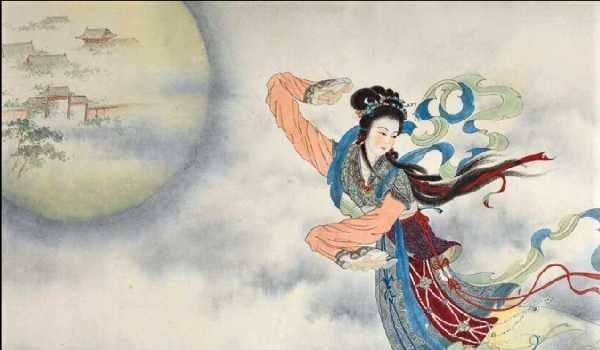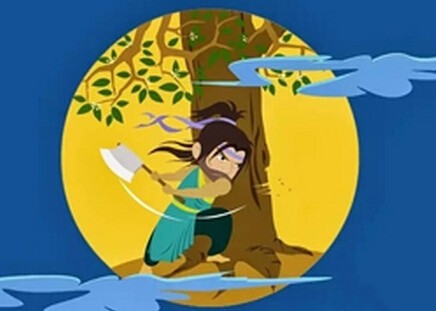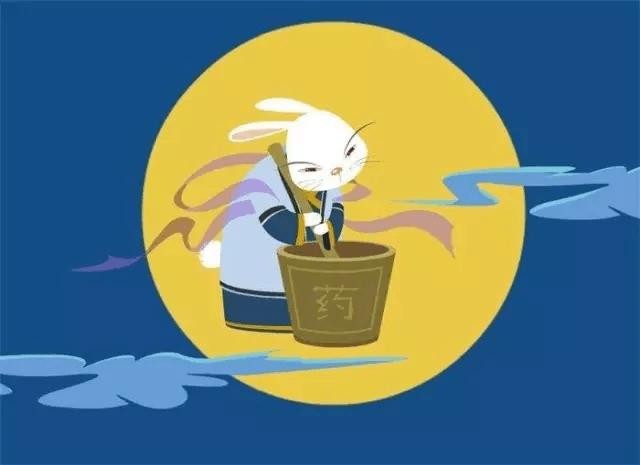Mid-Autumn Festival Legends
Chang'e (Chang E) Flying to The Moon
 According to legend, in ancient times, there were ten suns shining in the sky simultaneously, which made the crops wither and the people suffer a lot. A hero named Hou Yi, an archer of great strength, took pity on the suffering people and climbed to the top of Kunlun Mountain, shooting down nine suns in one go, so that people could live and work in peace and happiness. Hou Yi was thus respected and loved by the people. Unexpectedly, the nine suns shot down were all sons of the emperor, so the emperor was angry and relegated Hou Yi and his wife Chang'e (Chang E) to the mortal world.
According to legend, in ancient times, there were ten suns shining in the sky simultaneously, which made the crops wither and the people suffer a lot. A hero named Hou Yi, an archer of great strength, took pity on the suffering people and climbed to the top of Kunlun Mountain, shooting down nine suns in one go, so that people could live and work in peace and happiness. Hou Yi was thus respected and loved by the people. Unexpectedly, the nine suns shot down were all sons of the emperor, so the emperor was angry and relegated Hou Yi and his wife Chang'e (Chang E) to the mortal world.
In addition to imparting archery skills and hunting, Hou Yi spent all days with his wife, and people envied this loving couple of great talents and beauty. Many aspirants became followers and came to learn the skills from them, and a man named Peng Meng, who was unscrupulous and treacherous was among them.
One day, Hou Yi went to Mount Kunlun to visit friends to seek for advice, and coincidentally met Wang Mu, the Queen of Heaven, who passed by, so he asked the Queen of Heaven for a packet of immortality medicine. It is said that by taking this medicine one mortal man can instantly ascend to the heaven and become immortal. However, Hou Yi could not leave his wife behind, so he gave the medicine to Chang'e for safe keeping temporarily. Chang'e hid the medicine in a treasure box on her dresser, but the villain Peng Meng saw it and tried to steal the medicine to become immortal himself.
Three days later, Hou Yi led the disciples to go out hunting, and the evil-minded Peng Meng pretended to be sick and stayed behind. Soon after Hou Yi left, Peng Meng entered the backyard of the house with a sword in his hand and forced Chang'e to hand over the elixir. Chang'e knew that she was no match for Peng Meng, so she made a quick decision and turned around to open the treasure box and took out the elixir and swallowed it. Chang'e swallowed the medicine, her body immediately floated off the ground, rushed out of the window, and flew up to the sky. Because Chang'e was concerned about her husband, she chose to fly to the moon, the closest planet to the earth, so that she could stay nearer to her husband.
In the evening, Hou Yi returned home, and the maids cried about what had happened during the day. Hou Yi was both shocked and angry, grief-stricken, looking up at the night sky to call the name of his beloved wife. At that moment, he was surprised to find that the day's moon was extraordinarily bright, and there was a swaying figure resembling Chang'e. He desperately run towards the moon, but he cannot catch it anyway.
Hou Yi was helpless and missed his wife. So, she had no choice but to send someone to the favorite garden of Chang E, set up a joss stick an incense table, put her favorite honey and fresh fruit, and pay tribute to Chang E, who was in the Moon Palace. When the people heard the news that Chang E had run to the moon and become immortal, they set up joss sticks under the moon and prayed to the kind Chang E for good luck and peace.
From then on, the custom of worshipping the moon at the Mid-Autumn Festival has spread among the people.
Woodsman Wu Gang Chopping the Laurel Tree
 Another legend about the Mid-Autumn Festival has it that a laurel tree in front of the Guanghan Palace (the Moon Palace) on the moon grew luxuriantly and was more than 500 feet high, and there was a man down there who used to cut it down, but every time after cutting, the area where it was cut immediately closed up and self-healed again. For thousands of years, the tree could never be chopped down. It is said that the man who chopped the tree was named Wu Gang, a native of Xi He in the Han Dynasty (202 BC - 220 AD) , who had once followed the immortals in their monastic life. After he went to the heaven, he made a mistake. The immortal delegated him to the Moon Palace. One saying said that he did not concentrate enough on learning immortality, and the Heavenly Emperor, in order to refine his mind, punished him by cutting down the laurel tree, promising that if he cut it down, he would become immortal. So, Wu Gang chopped the laurel tree down in the Moon Palace day after day, year after year.
Another legend about the Mid-Autumn Festival has it that a laurel tree in front of the Guanghan Palace (the Moon Palace) on the moon grew luxuriantly and was more than 500 feet high, and there was a man down there who used to cut it down, but every time after cutting, the area where it was cut immediately closed up and self-healed again. For thousands of years, the tree could never be chopped down. It is said that the man who chopped the tree was named Wu Gang, a native of Xi He in the Han Dynasty (202 BC - 220 AD) , who had once followed the immortals in their monastic life. After he went to the heaven, he made a mistake. The immortal delegated him to the Moon Palace. One saying said that he did not concentrate enough on learning immortality, and the Heavenly Emperor, in order to refine his mind, punished him by cutting down the laurel tree, promising that if he cut it down, he would become immortal. So, Wu Gang chopped the laurel tree down in the Moon Palace day after day, year after year. Jade Rabbit Pounding Herbs
 It is said that when the body of Chang E became lighter and began to ascend up to the sky after swallowing the immortality pill, she picked up the white rabbit she had been feeding. The white rabbit then went with her to the moon. The Jade Rabbit had a mortar and pestle in the Moon Palace and pounded the elixir of immortality in the mortar at night. Over time, the Jade Rabbit became synonymous with the moon, and ancient writers often used the Jade Rabbit to symbolize the moon when they wrote poems and lyrics. When the myth spread to Japan, it became the Jade Rabbit pounding rice cakes.
It is said that when the body of Chang E became lighter and began to ascend up to the sky after swallowing the immortality pill, she picked up the white rabbit she had been feeding. The white rabbit then went with her to the moon. The Jade Rabbit had a mortar and pestle in the Moon Palace and pounded the elixir of immortality in the mortar at night. Over time, the Jade Rabbit became synonymous with the moon, and ancient writers often used the Jade Rabbit to symbolize the moon when they wrote poems and lyrics. When the myth spread to Japan, it became the Jade Rabbit pounding rice cakes.Zhu Yuanzhang's Mooncake Uprising
The tradition of eating mooncakes on the Mid-autumn Festival is believed to start in Yuan Dynasty ((1271-1368). At that time, people were tortured by the cruel government, which prompted a nationwide rebellion. Zhu Yuanzhg, founder of the Ming Dynasty (1368-1644), united all the resistance forces to prepare for the uprising and became a rebel leader. However, the imperial court officials and soldiers searched very closely, and it was very difficult to transmit the messages. Liu Bowen, the military advisor of Zhu Yuanzhang, came up with the idea of hiding notes containing the message of “uprising on the night of August 15th” in mooncakes and distributing them to resistance forces. On the day of the uprising, all the rebels responded together.
Soon, the ploy worked, and Xu Da successfully took the capital of the Yuan Dynasty. The uprising was successful. When the news came, Zhu Yuanzhang was so happy that he gave an oral message to let all the generals and soldiers have fun with the people in the upcoming Mid-Autumn Festival, and gave the "moon cakes", which were used to secretly transmit information when the uprising took place, to the ministers and officials as festive cakes. Since then, moon cakes have become more and more elaborate and varied. After that, the custom of eating moon cakes at the Mid-Autumn Festival spread among the people.
Chinese Calendar
| Su | Mo | Tu | We | Th | Fr | Sa |
|---|---|---|---|---|---|---|
| 1十四/14 | 2十五/15 | 3十六/16 | 4十七/17 | 5十八/18 | 6十九/19 | 7二十/20 |
| 8廿壹/21 | 9廿二/22 | 10廿三/23 | 11廿四/24 | 12廿五/25 | 13廿六/26 | 14廿七/27 |
| 15廿八/28 | 16廿九/29 | 正月 (Jan) 17初壹/1 | 18初二/2 | 19初三/3 | 20初四/4 | 21初五/5 |
| 22初六/6 | 23初七/7 | 24初八/8 | 25初九/9 | 26初十/10 | 27十壹/11 | 28十二/12 |
{{week}}. {{month}} {{day}}, {{year}}
Lunar Date
{{lmonth}} {{lday}}, {{syear}} ({{zodiac}}) Year ({{lyear}}){{sday}} Day, {{smonth}} Month
Clash {{clash}} | Evil {{evil}}
Auspicious
-
{{#luckly}}
- {{.}} {{/luckly}}
Inauspicious
-
{{#unluckly}}
- {{.}} {{/unluckly}}
Auspicious Times
-
{{#luckyTime}}
- {{.}} {{/luckyTime}}
